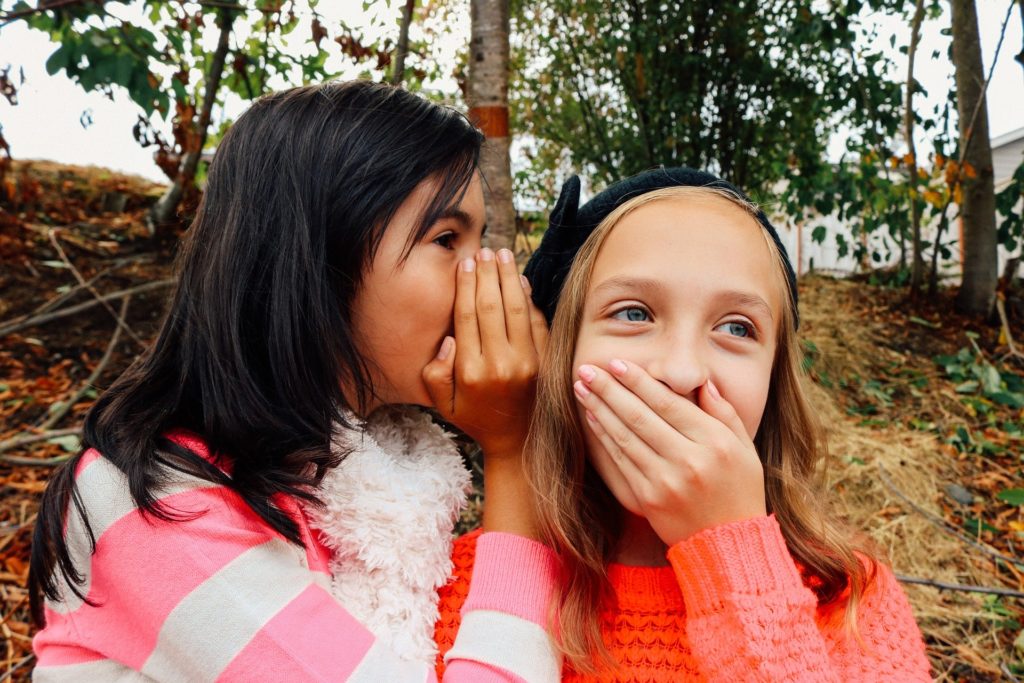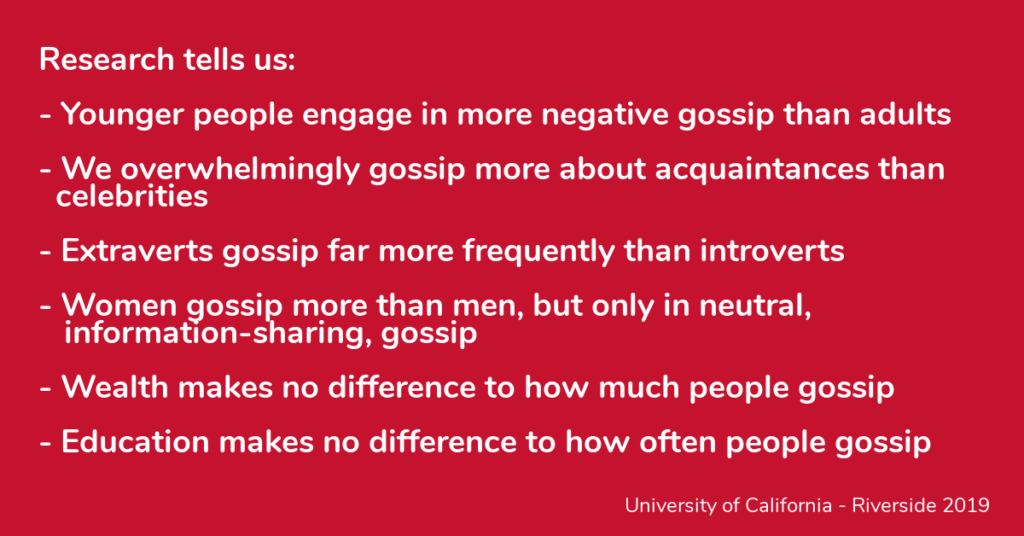Kids and Mean Gossip

It was Monday afternoon and I felt helpless as Carrie, a Year 6 student, sat on the couch in the school’s front office, knees pulled up to her chest, rocking and sobbing. She could barely tell me what was wrong, so we phoned her mother and asked her to come into school.
When her mum arrived, it came out that over the weekend, Carrie had attended a sleepover with four other friends. In confidence, she had told them that she felt uncomfortable around one of their classmates, Jenna, who was very outgoing. Carrie is a quiet child and she said she felt a bit intimidated.
By Monday morning, the gossip had begun. There was a cyclone of whispers. There was giggling and pointing, and the story had transformed to, ‘Carrie hates Jenna and was saying terrible things about her’. Of course, Jenna felt hurt. She gathered supporters and the drama cyclone gathering speed.
How did this happen? It’s hard to know, perhaps tall tales for attention, or children using the information as currency? Probably both. It doesn’t really matter. The perceived crime was never going to compare to the weapon of revenge…. Gossip. Word had spread in a heartbeat. There was innuendo, scorn, and a hatred that is saved for those who break the social and moral order of a playground community.
That said, gossip isn’t a weapon only used by adolescents. It is used at every age, in every social class, all over the world. It is insidious. It is easy to initiate, difficult to counter and it can devastate the target. From an early age, we learn to recognise the power of gossip and as much as we all fear it, we have all been guilty of participating.
What is gossip?
Technically, gossip is just conversation about someone who isn’t present. By that definition, we all do it constantly and it is almost impossible not to gossip. However, gossip can be broken down into types; neutral, positive, or negative.
Research tells us that the vast majority of gossip is neutral, it is exchanging information in order to connect with others. About 75% of gossip is neutral. About 9% is positive, it celebrates other people’s successes and builds them up. Finally, there is negative gossip, the kind that damages a person’s reputation and social standing. Unfortunately, young people tend to participate in negative gossip more than adults. This is the kind of gossip that can break the culture of a school, a workplace, a sporting club, or any other community.
Why do people gossip negatively?
- Gossiping bonds us. There is an intimacy that comes with sharing information and struggles. Research shows that about 90% of this sort of gossip is venting and not meant maliciously.
- Gossip polices the moral order. When a person steps out of the moral order that has been established and generally accepted, they can be pushed back into line with gossip. Young people in particular want to avoid being singled out, so will conform in order to avoid the special attention of gossip.
- Gossip is a social currency. Kids in particular use gossip as a form of currency. The amount of information you have about others is a measure of how connected you are. Connection is status.
- Gossip is entertainment. As hard as teachers try to make their lessons enthralling, the most interesting thing about school for most kids is…other kids. When something notable happens, it is discussed. If nothing notable happens, stories become embellished.
- Gossip establishes identity. It creates an ‘us vs them’ mentality. Young people are especially drawn to this form of tribalism. They want to fit in and belong. Gossip helps establish membership and define strong boundaries to keep ‘others’ out.

Who gets gossiped about?
The common belief is that gossip happens to everyone and then it moves on. That is often what we tell children when they are suffering, “Don’t worry, they will move on to the next person tomorrow”. The problem is, gossip does discriminate. There is usually more gossip about kids who are socially vulnerable. They may be vulnerable due to poverty, race, sexuality, or any other social discriminator, even just popularity. For example, a teenager who is Indigenous who drinks alcohol will be spoken about differently than their Caucasian peers. It’s not fair.
We have to break this idea that gossip is shared around equally, it isn’t. By saying it is, we invalidate the real discrimination that is going on. Gossip further disempowers those who are already struggling and perpetuates unhelpful stereotypes.
How do we change a culture of mean gossip?
- We know that the percentage of gossip that is mean is quite low. However, the culture of a school or workplace will be determined by exactly how small that percentage of mean gossip really is. It is therefore important to talk about gossip and call it out when we see it.
- Knowing how to stop gossip is an invaluable skill. It is not easy for a young person to take control of a situation and do that, especially if they do not have a lot of social influence. However, if you teach them a few comments to use, it becomes much easier. For example:
- Why are you telling me that?
- I’m trying not to gossip so can we talk about something else
- I think we could talk about something nicer
- That’s my friend and I don’t want you to badmouth them
3. If they don’t think they can shut gossip down verbally, teach kids the value of their body language. Tell them, “When someone is gossiping, look away, and don’t say anything. Don’t smile or nod. Say nothing and then change the subject.”
4. Even just acknowledging gossip is a problem and telling children that it won’t be tolerated will put them on notice.
Finally…
When I think about Carrie, I have no doubt she will be just fine, but I know she will internalise lessons from her experience. The worry is which lessons will she take on? Will she learn not to trust people? Will she learn that you’re never really safe?
Hopefully, she learns that sometimes people act badly, and we feel absolutely awful, but no feeling lasts forever. Hopefully, she learns that she is stronger than she thought. And hopefully, we learn that it is possible to create a better culture for our children.

Santa Maria Teams Shine in Term 1 Sports
Santa Maria had a huge number of girls in the IGSSA AFL and Volleyball competition with strong results for a number of teams.

Lee-Elle’s Insights from the ‘Make it 16’ Forum
Lee-Elle Cooper is a passionate Year 12 student who advocates for youth engagement and political participation. She has recently returned from the Make It 16 Forum in Canberra.

With Laurissa Knowles From Valley Depths to Mountain Peaks (1993)
Laurissa Knowles (1993) has had an incredible career journey so far, from Santa Maria College Teacher to Celebrant and Councillor.
- Featured #Connectinglearning2life
Author: Santa Maria College
Santa Maria College is a vibrant girls school with a growing local presence and reputation. Our Mission is to educate young Mercy women who act with courage and compassion to enrich our world. Santa Maria College is located in Attadale in Western Australia, 16 km from the Perth CBD. We offer a Catholic education for girls in Years 5 – 12 and have 1300 students, including 152 boarders.







